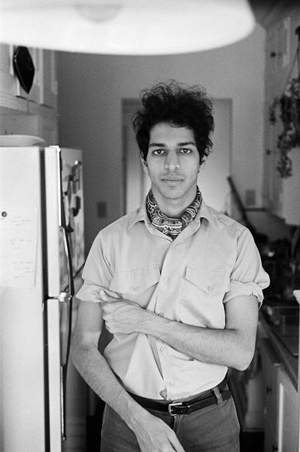
Vikesh Kapoor
By Vivian Nguyen
Northwest Asian Weekly
For folk singer and songwriter Vikesh Kapoor, he is a musician first and a social observer second.
A first-generation Indian American, Kapoor draws on observations and reactions to the world around him for inspiration. Born and raised in rural Pennsylvania, his first taste of the larger world came when he took a masonry apprenticeship in college.
“It wasn’t as romantic as it sounds,” said Kapoor. “But it took me out of a world that I was used to. And once I got out of my hometown bubble, I was never the same.”
Kapoor’s apprenticeship led him to seek more eye-opening opportunities, such as doing volunteer work in the Delta region. As he helped others in low-income areas and observed their struggles, Kapoor’s idea of the American Dream was challenged.
“Watching anyone come from tough circumstances and trying to make it is inspirational,” said Kapoor. “But you also see these people struggling to make something happen for themselves. And sometimes, for reasons out of their control, their efforts result in a dead end, despite all their hard work and sacrifice.”
It’s this train of thought that would influence the primary theme in Kapoor’s music. During this time, he performed at social activist Howard Zinn’s memorial service. Inspired by Zinn’s crusade against class and race injustice, in addition to his own reflections of the fractured American Dream, Kapoor moved to Portland, Ore., and spent the next two years working on his concept album.
Questioning the American Dream
Kapoor’s full-length debut record “The Ballad of Willy Robbins” explores the issues of disillusionment, despair, and romanticism of the American Dream. Based loosely on a news article that details the struggles of a working-class man, the album’s title character, Willy Robbins, refers to a person who feels a sense of disappointment with the direction or state of their life — a sentiment that Kapoor, too, sometimes identifies with.
“He’s definitely me,” acknowledged Kapoor about his titular character.
“But [Willy Robbins] can also be anyone in everyday life. Often, I see myself frustrated about change, whether it is personal or political. So my songs were born out of my reaction to these events. Willy Robbins isn’t a mask for me to bear my confessions, but aspects of what [the average person] goes through that I also feel in my life.”
In the news article, the working class man falls in a scaffolding accident, leaving him unable to work and struggling to make ends meet.
Between his soulful sounds, political lyrics, and the old time images that his melodies evoke, parallels are often drawn between Kapoor’s music to that of legendary political folk singers, such as Woody Guthrie and Bob Dylan. Though flattered, Kapoor is quick to dismiss the comparisons.
“It’s a function of giving listeners an idea of what to expect from my music,” said Kapoor. “In reality, I’m not even close. I’m still finding my voice, and it’s only my first album.”
One comparison one cannot help but draw, however, is the theme of apathy found in Kapoor’s music.
Apathy is often associated with his millennial generation and, despite his political sound being compared to older times and people, Kapoor maintains that he writes to a modern time period.
“I’m not trying to do a throwback or a museum piece when it comes to folk music,” said Kapoor. “So apathy was definitely intentional on this record. I wanted to write contemporary songs — protest songs that criticize and deal with the now.”
On being an artist
Although Kapoor’s parents are happy and supportive of his music career, he admits there are difficult moments given the values of his parents’ generation, which prizes more practical, stable jobs.
“After all their sacrifices, I understand why immigrant parents might be cautious about the type of careers their children choose,” acknowledged Kapoor. “And in my experience, it’s hard to break away from those pressures.”
For Kapoor, it came down to pursuing something that satisfied him, even if it meant taking a risk. But he noted that the pressure to succeed does not go away, and that it actually heightens, as Kapoor needs to prove himself while pursuing a career that is not viewed as practical.
He continued, “Art does not seem practical to many. It may even seem frivolous, but art can actually do much good for society.”
Next on the horizon: Seattle and beyond
With his album out, Kapoor has an entire U.S. tour ahead of him that will take him to both sides of the country.
One of his upcoming stops will be in Seattle for the first annual Winter Fireside Party, a benefit music event for the multicultural arts nonprofit Northwest Folklife.
The benefit, which will take place at The Vera Project on Jan. 25, will be an all-day and evening event, featuring string bands, indie-roots, and blues and gospel music in a cozy and intimate setting.
Kapoor will perform an acoustic set at 4:30 p.m. With 2014 underway, Kapoor is eager to get back out on the road, as well as connect with new listeners.
“There are still so many people who haven’t heard this album and don’t know who I am,” he said. “I want to meet them, and have them connect with this album in their own way.
“My music follows a story, but I hope it still speaks to things people feel in their own lives, too.” (end)
For more information or to buy tickets to the Winter Fireside Party benefit, visit nwfolklife.org or folklifefiresidefundraiser.brownpapertickets.com.
To learn more about Vikesh Kapoor and his music, visit vikeshkapoor.com.
Vivian Nguyen can be reached at info@nwasianweekly.com.



